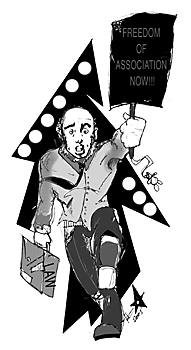
Illustration by Mike Padilla
|
|
By Rui Wang
Arizona Daily Wildcat
Wednesday, February 23, 2005
Print this
Confession: I am a makeup junkie, which is stupid because I wear the stuff maybe once a month. Maybe. But each year, that doesn't stop me from buying enough to fuel the Miss America pageant several times over, or at least fill up a huge drawer in the bathroom.
I'm seduced by the beautiful packages, sleek and jet black, each containing the tiniest bit of pulverized rock. Sometimes, I look over my Sephora receipt while guiltily sliding away the "Doctors Without Borders" solicitation letter, but I don't stop buying makeup. It doesn't help that there's a Clinique counter in the bookstore, or that my neighbor has the entire Avon collection in the back seat of her Explorer. How she keeps it all from melting here in Arizona is beyond me.
Maybe I like makeup so much because my mom never wore any herself. When other little girls were playing with red lipstick and shuffling around in oversized heels, I was dabbing on Vaseline as lip gloss and inspecting a fleet of sensible flat shoes.
I can't even pronounce the names of the products I have: What the heck is an irréelle ombre? And what does it mean if something is aux yeux?
The cosmetics industry has been brilliant about marketing their products to women, myself included. Those inscrutable French names are a start. Would anyone spend $20 for an eye shadow if it was called, well, "eye shadow?"
This success comes despite the fact that fancy makeup is exorbitantly expensive. It has a much higher profit margin than apparel, which is why you see makeup counters occupying the plum positions downstairs at the department store - or right next to the cash register at the UofA Bookstore.
Groundbreaking feminist Betty Friedan, founder of the National Organization of Women, warned that corporations were exploiting women through the use of advertisements in her classic 1963 book "The Feminine Mystique." The same idea applies today, only tenfold. Radical feminists went even further to state that cosmetics advertisement is a tool of slavery over women, reducing them to the role of sexual objects in the media.
It's a bit extreme to analogize a tube of lipstick to a branding iron or to view a mascara wand as a subjugating yoke. However, the expectations of how cosmetics fit into ideas of beauty and gender are still around. A particularly enlightened and sensitive male friend recently expressed surprise that women who worked in his office "wore skirts but didn't wear makeup." As if wearing makeup, like wearing skirts, was a necessary component of the female costume.
Besides, it's hard to tell who's wearing makeup anymore. Flipping through women's magazines this month, it's interesting to note just how un-made-up all the models look right now, like they were hatched flawless from preservative-filled holding tanks. This is probably the hardest beauty ideal to live up to, of all the ideals we are bombarded with each day.
I really admire women who are brave enough to paint their lids bright blue and their lips blood red. The current cultural backdrop emphasizes - among other things like "being patriotic" and "blindly supporting the troops" - uniformity, demureness, submission and being pretty to the point of being precious. Being bold, especially when it comes to how you look, suddenly has an appealing, individualistic quality.
Perhaps in response to long-held feminist criticisms, the cosmetics industry sometimes portrays makeup as a tool of artistic creativity and empowerment, which isn't entirely untrue. After all, everyone loves finger painting.
After surfing through makeup Web sites, I'm amazed at how technical and esoteric the language can get. One woman, with all the assurance of a master painter, suggests using MAC Stippling Brush Number 187 to pick up concealer from the bottle, swirl on the back of the hand and brush upward along the face starting from the jaw line. Another suggests mixing three specific lipsticks together to create the perfect shade, but fans of the movie "Kissing Jessica Stein" already know about that.
Every year, I resolve not to buy any more makeup. I also resolve not to philosophize so much every time I open up a tube of lipstick and look down the barrel. But if I stick to my resolutions, I'll be well into the next decade before I can go into another department store, drugstore, Sephora, the Internet, or my neighbor's house or - well, you get the idea. It's everywhere.
Rui Wang is a third-year law student. She can be reached at letters@wildcat.arizona.edu.
